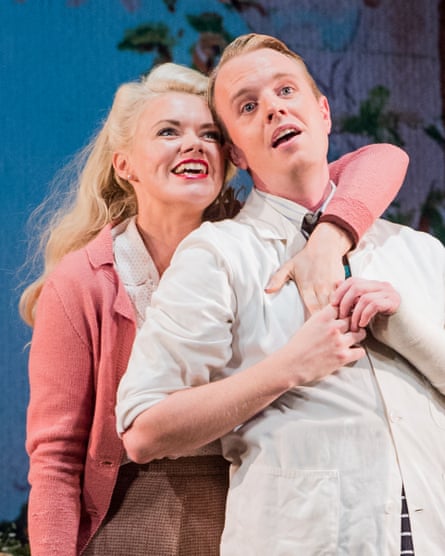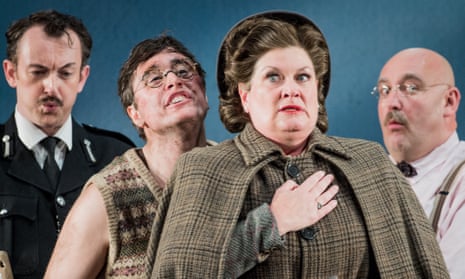Perhaps it was the way the town’s Georgian stone glowers in the drizzle, or the fact that rail chaos had prevented my arriving in time to catch Verdi’s Macbeth, that high noon of Italian operatic romanticism. Feeling a touch murderous myself, I arrived in Buxton hankering for sturm und drang. So I confess my heart sank when, minutes into a performance by members of venerable period band the English Concert, we were assured that the evening’s fare would be “almost easy listening”. Bach, Mozart, Haydn and co rebranded as purveyors of musical wallpaper? Really?
Well, not quite. The programme of works for flute, violin, viola and cello certainly had its moments of showcasing the Viennese school at its most aristo-appropriate, with nothing to upset the digestion. Haydn’s Trio in C Major for flute, violin and cello was impressively neat and occasionally, politely exuberant – but probably best left as supper entertainment. A flute quartet attributed to Mozart (more likely a forgery) was similarly low-octane though always gracious.
Yet elsewhere there was more going on. A transcription for string trio (again, perhaps by Mozart) of JS Bach’s Adagio and Fugue in F and D Minor was astonishingly lush in its spacious slow movement, the raw edge of open gut strings then cutting through in dramatic fugal entries. Mozart’s Flute Quartet in D Major, K285 placed that gut-string bite in dialogue with the mellow tone of Lisa Beznosiuk’s wooden flute, her agile, unfussy passagework matched by Nadja Zwiener’s easy virtuosity on violin and Alfonso Leal del Ojo’s all-important harmonic motoring on viola. Here and throughout Joseph Crouch (cello) took extraordinary care with every note, providing robust but sensitive support and shaping hyper-conventional basslines into beguiling, basso cantante melodies. Easy listening this was not.

Britten’s 1947 comic opera Albert Herring (seen here in a production by Francis Matthews, designed by Adrian Linford) was first performed at Glyndebourne, to the disapproval of then owner John Christie. Herring definitely is Britten-lite – albeit with an ambiguous moral undertow. Its plot revolves around the crowning of Albert Herring as village May king in the absence of a suitably chaste candidate for queen. From the stray hand that emerges from under the curtain at the opera’s start (a young couple up to no good in the foliage) to the sign advertising the May king’s sudden disappearance (“Missing A Herring”) this Buxton production is all about comic details.
Austerity-chic costumes, ration books, and posters from Labour’s postwar election campaign root us in the years of the opera’s gestation. Folding flats (shifted around by beige-clad local lads and landgirls) offer a basic sense of interior spaces, furnished with a superfluity of chairs and a framed portrait of Winston Churchill for the residence of fearsome local grandee Lady Billows, and the inevitable grocer’s cart and baskets of muddy veg for Albert’s shop. Only the backdrop – a huge, unfinished, framed painting of the local landscape (ironic distancing from the action, perhaps?) – and a red phone box, on stage throughout though empty for all but a few seconds, offer more ambitious directorial input.
However, this 2D world was brought to life by consistently excellent acting and some good singing, too. Best of the lot was Bradley Smith’s Albert Herring, who managed a convincing transition from painfully awkward mummy’s boy to man of the world, via a genuinely poignant dance scene (choreographed by Simeon John-Wake) and whose featherweight tenor gained expressive heft as his character’s confidence grew. As Lady B, Yvonne Howard was a true uber-matron, with an irresistible repertoire of grimaces to boot; her housekeeper Florence Pike (Lucy Schaufer) boasted a rich, densely packed mezzo and a powerful stage presence; Morgan Pearse and Kathryn Rudge were thoroughly charming as lovers Sid and Nancy; and RCM student Sophie Gallagher impressed as Emmie, one of the opera’s several “child” roles. In the pit, Justin Doyle provided an enthusiastic, no-nonsense reading of Britten’s deceptively simple score, with a one-to-a-part redux of the Northern Chamber Orchestra providing seductive woodwind solos and fine ensemble playing alike.
This was, perhaps, a safe bet: a crowd-pleasing 20th-century opera (a rare breed), on a scale ideally suited to Frank Matcham’s lovely Buxton theatre. But there was also bolder programming, with a lunchtime recital by mezzo Lotte Betts-Dean and guitarist Andrey Lebedev – both recently graduated – an unexpected highlight.
Dowland lute songs and Britten folk songs showed off Betts-Dean’s warm lower register and impressive control, and Lebedev’s quietly expressive virtuosity. But it was Betts-Dean’s irrepressible sense of drama and extraordinary self-assurance in her father Brett Dean’s Gertrude Fragments (spin-offs from his recent Hamlet for Glyndebourne) that made this recital so compelling. As singing plunged by turn into whispering or guttural groaning, Betts-Dean manoeuvred unflustered between registers and vocal modes with an unbroken sense of line and an unmissable, urgent musicality. She’s not Sarah Connolly, as she giggled apologetically, but she’s certainly one to watch.

Comments (…)
Sign in or create your Guardian account to join the discussion